|
FAQs on Anemone Identification
32
Related Articles: Anemones,
Bubble
Tip Anemones, LTAs, Cnidarians, Coldwater Anemones, Colored/Dyed Anemones,
Related FAQs: Anemone ID 1, Anemone ID 2, Anemone ID 3, Anemone ID 4, Anemone ID 5, Anemone ID 6, Anemone ID 7,
Anemone ID 8,
Anemone ID 9, Anemone ID 10, Anemone ID 11,
Anemone ID 12,
Anemone ID 13, Anemone ID 14, Anemone ID 15, Anemone ID 16, Anemone ID 17, Anemone ID 18, Anemone ID 19, Anemone ID 20, Anemone ID 21, Anemone ID 22, Anemone ID 23, Anemone ID 24, Anemone ID 25, Anemone ID 26, Anemone ID 27, Anemone ID 28, Anemone ID 29, Anemone
ID 30, Anemone ID 31, Anemone ID 32, Anemone ID 33, Anemone ID 34, Anemone ID 35, Anemone ID 36, Anemone ID 37, Anemone ID 38, Anemone ID 39, Anemone ID 40, Anemone ID 41,
Anemone ID 42,
Anemone ID 43,
Anemone ID 44, Anemone ID 45,
& Cnidarian Identification, Anemones 1,
Anemones 2, Anemones 3, Anemones
4, Anemones 5, Invertebrate Identification, Aiptasia
Identification, Aiptasia ID
2, LTA
Identification, Bubble Tip
Anemones, Caribbean
Anemones, Condylactis, Aiptasia
Anemones, Other Pest
Anemones, Anemones and
Clownfishes, Anemone
Reproduction, Anemone
Lighting, Anemone Feeding,
Anemone Systems,
Anemone
Compatibility, Anemone
Selection, Anemone
Health, Anemone Behavior,
Anemone
Placement,
|
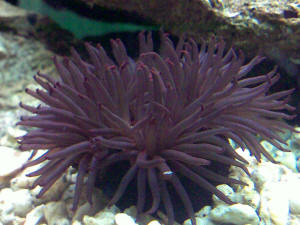
|
 |
New Print and
eBook on Amazon:
Anemone Success
Doing what it takes to keep Anemones healthy long-term
by Robert (Bob) Fenner
|
|
Unidentified sand dwelling Anemone
12/18/09
Hey guys.
I've had these in my main tank for some time and have had no
idea what to call them.
<Johnny Bag 'O Donuts? Hey there Sammy Boy? Bob?>
the closest approximation I could find was something called a
Edwardsiid from Indonesian waters but I cannot be certain that is
what I am looking at.
The animals have a semi rough tube like body that somewhat
resembles a grub when retracted,
Its pedal disk is reduced down to a very small point yet still
seems to work as a hold fast.
There is two rows of six tentacles which always splay upward
virtually motionless.
It is highly sensitive, retracting with lightening speed when
irradiated.
Its very small, only about a quarter of a inch in diameter at the
most with a column length of just over one inch.
Is this a photosynthetic animal or does it lack
zooxanthellae?
<Looks like the latter, but... could just be bleached
here>
if its not photosynthetic what food items does it require?
<Likely small meaty...>
Thanks WWM
Cheers.
<I think this might be Actinoporus elongatus. Bob
Fenner>
|
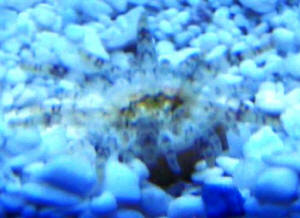 |
|
Please I D -- 11/17/2009
Hello,
I am new to your sight, I do not know if this is the proper way
to get an ID. But here it goes. I believe it to be an Anemone of
some type. It does walk. Does not like high current or high
lighting. It does feed on shrimp and has only 6 (I believe)
tentacles that grasp food items. It has multiplied in my tank.
Twice in the last year. Size is about 2 inches. I will send a pic
in the form of an attachment. Again sorry if this is not the
proper method to ID .
Thank
You
Rich Harned
<Interesting... I still don't know what this arborose
Actinarian is... but we recently had someone else send in I think
the same animal. See here:
http://wetwebmedia.com/AnemID32.htm
Bob Fenner, still stumped>
|
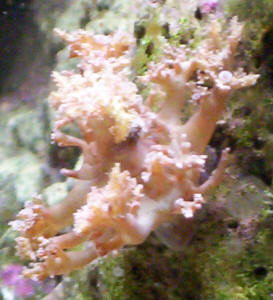 |
|
Re Anemone ID 11/18/09
Hi crew!
regarding the anemone ID from today's FAQs - could it be some
type of Actinodendron with partially retracted tentacles? Maybe
Actinodendron plumosum?
Cheers, Alex
<Mmm, thanks for trying... but all members of this family are
Indo-Pacific... and the original pic came from Panama. Bob
Fenner>
Re: Anemone ID
Ah, I wasn't aware that a place of collection was given in a
previous query.
You're right, Actinodendron is out of the question, then.
Alex
<A schwing and a miss... but at least you're batting! Be
chatting Alex.
BobF>
|
|
majano anemone? No reading -- 11/12/09
am new to saltwater tanks and I bought a large snail and this was
growing on the back of it and I was wondering if u knew what it
is because some people were saying it could be a majano
anemone
thanks
<Mmm, maybe. Please read here:
http://wetwebmedia.com/otherpstanemfaqs.htm
and the linked files above. Bob Fenner>
|
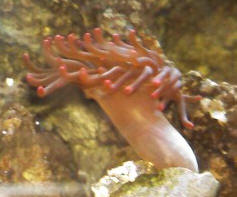 |
|
Re: Orange rock beauty, Anem. ID! 11/6/09
Bob, I'm sending you a couple of pictures of the anemone, I
think is an anemone because it has a mouth and can walk around
like one, it also have 2 sets of tentacles the branch looking
ones and a normal ones. One of the pictures is how it looks full
expanded when the lights are on, the other of how if looks
resting and one picture of it moving around where you can see its
seconds set of tentacles. A very impressive animal and one of my
favorites of my tank, please feel free to use all the pictures I
have send you.
Saludos
PS: I think you should come to panama here you have the advantage
of diving in 2 different seas and believe me you won't
regretted.
<Very interesting... thank you for these further photos; and
Panama is one of the few countries in C. America I have not been
diving in. I will hopefully one day! Bob Fenner, who has asked
LynnZ for help!>
A bizarre anemone?
Lynn, please take
a gander at the query in your WWM in-folder... What is this
thing? BobF
Holy cow, that is one odd-looking organism! I'm not sure what
it is, but will look around tomorrow and see what I can find.
Take care, Lynn
|
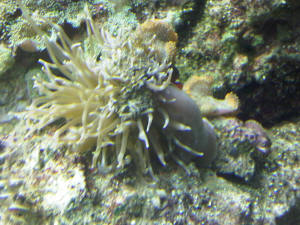 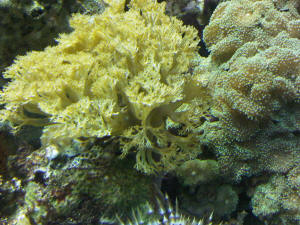 |
|
Re: A bizarre anemone?
11/6/09
Always a pleasure, Bob. I looked around last night and this
morning but unfortunately didn't find an exact match. I did
learn a lot, though! The closest I could find from the Caribbean
were two species of branched anemone: Lebrunia coralligens and
Lebrunia danae (family Aliciidae). They show the same distinctly
different true tentacles and branched pseudo-tentacles.
<Yeah... but I've seen both these in the wild... this is
something else entirely. The genus Lebrunia really are cryptic,
hidden amongst, under rock, corals... this thing is out and
about, shouting: "Hey Lynn and Bob, try to find out who I
am!">
However, I was unable to find any individuals showing such highly
branched, almost frondose pseudo-tentacles. According to this
site (http://tolweb.org/Lebrunia/18669) it sounds like they start
off less ornate/branched when young, but become more so with
maturity. Who knows - it could be a mature Lebrunia or something
else entirely. The only thing I can recommend to Marky is to
avoid contact with bare hands in case it is a Lebrunia species.
Apparently, the tentacles can sting the daylights out of you! As
in yikes!
Sorry I couldn't have been more helpful!
Take care,
-LynnZ
<I think this is one of those mysteries that will remain so,
till we suddenly are presented with the specific answer out of
the proverbial azule. Gracias, Roberto>
|
|
Re: Anemone & Crab ID Query 10/9/09
Hi Bob and Crew,
I saw this query come in but unfortunately can't ID the
anemone in question. As for the crab, it looks like a Xanthid of
some sort but unfortunately, there's just not enough
information for me to take it any
further. I don't know the crab's size, where it
originated, or if it was associated with anything else. In
addition, I can't quite see enough of the carapace or claws.
It looks like a lot of detail (how hairy...where hairy, surface
texture/bumps) is lost/obscured because the crab's out of
water, with water clinging. Anyway, all I can really offer is
that it's likely a Xanthid. Sorry about that...wish I could
be of more help!
Thanks!
-LynnZ
<Thank you Lynn... I can't tell much more myself.
BobF>
Lynn/Crew,
I also didn't grab the query because of the crab ID, but I
believe the anemone is a Long Tentacle/Corkscrew (Macrodactyla)
Anemone. The picture quality is poor/dark so I'm not betting
any money on it.
James
<Me neither. BobF>
Anemone & crab ID
Hi need an ID for this anemone. it's color is dark
brown/maroon.
Thanks Siddharth
<Can't discern from this poor photograph. Bob
Fenner>
|
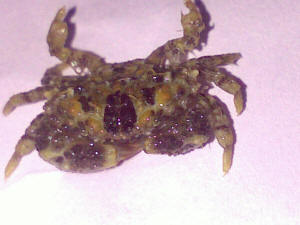 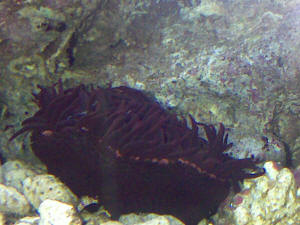
|
Re: Anemone & crab ID
10/10/09
Hi sorry about the poor pics, managed to get some more.
hope these ones turn out ok.
Regards Siddharth
<Please see here:
http://www.wetwebmedia.com/marine/inverts/cnidaria/anthozoa/anemones.htm
and the linked files above re ID... The crown looks like
Heteractis malu, but the pedicle? Is it as dimpled as it
appears? I don't know what this is if so. I don't
think it is a clown-hosting species. Bob Fenner>
|
 |
|
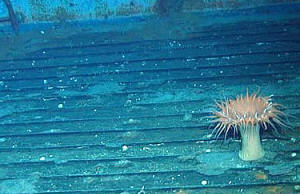 Ladder in upper left for size comp. Ladder in upper left for size comp. |
|
Re: Aiptasia pallida, Anem ID
10/7/2009
Morning Bob
Yes, the photo was from a wreck 2 miles deep and 150 miles
offshore. I know the A. pallida is not a local species but the
reason I am trying to identify is because it may now have become
local. The only species similar are all very shallow water or
sub-tidal ones, we don't appear to have any deep sea anemones
of this type at all on our own register
cheers
Jim
<As far as I'm aware (and I am not an Actinarian
"expert" by any means) there are no deepwater members
of the family Aiptasiidae... all species I'm familiar with
require some source of self-feeding through photosynthesis. I do
agree with your speculation direction... there are MANY
transplanted species about the planet. But I don't think this
is one. Have you solicited the opinion of Australian Cnidarian
experts? I think Phil Alderslade is still out on Heron Isl. And
there are some folks at the public aquariums
I'd try:
http://www.aquae.com/Aquariums_Ultra_Quick.html#Oz
Bob Fenner>
Re: Aiptasia pallida
10/7/2009
Thanks Bob
Much appreciated will follow through on that information, I'm
sorry to have bothered you will all of this, but as I though it
was well known in the US it may have been more easily
identified.
<Mmm, no worries (mate)... We're glad to help in what ways
we can/may...
But this is almost exclusively a "pet-fish" (ornamental
aquatics) site... I like to ask folks what they mean when they
say they've been "deep diving"... generally, as you
and I know, this means something less than two hundred feet
down... In the case of your image... it's 10,000 feet under
the surface! I know exceedingly little re this area>
Many thanks for all the trouble you have gone to with this
problem (of mine). Incidentally, the single item in the photo I
sent you may have given a false impression, the wreck is
covered
with them all over, including the surrounding seabed rocks
etc
cheers
Jim
<Thank you for sharing. BobF>
|
|
|

